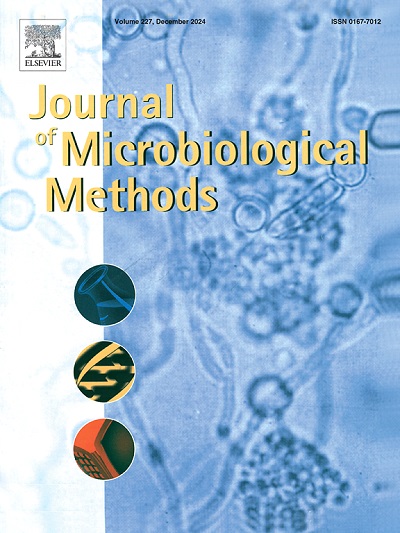Adapted molecular methods to unravel the recalcitrant mycorrhizal associations of Aucoumea klaineana Pierre
IF 1.7
4区 生物学
Q4 BIOCHEMICAL RESEARCH METHODS
引用次数: 0
Abstract
Understanding the role of root microbiota is crucial in sustainable forest management but remains challenging, especially for tropical trees. We developed an efficient and low-toxicity method to extract and amplify the fungal DNA associated with Aucoumea klaineana Pierre fine roots. To improve DNA quality, we optimized a commercial extraction kit by incorporating activated charcoal and modifying incubation periods. This enhanced protocol, combined with bovine serum albumin during PCR, effectively mitigated inhibitors present in A. klaineana tree root samples. This approach opens new perspectives for studying the microbiota of tropical trees.
采用分子方法揭示 Aucoumea klaineana Pierre 的顽固菌根关系。
了解根部微生物区系在可持续森林管理中的作用至关重要,但这仍具有挑战性,尤其是对热带树木而言。我们开发了一种高效、低毒的方法,用于提取和扩增与 Aucoumea klaineana Pierre 细根相关的真菌 DNA。为了提高 DNA 质量,我们优化了商业提取试剂盒,加入了活性炭并修改了培养期。这一改进方案与 PCR 过程中的牛血清白蛋白相结合,有效减轻了 Aucoumea klaineana 树根样本中存在的抑制剂。这种方法为研究热带树木的微生物区系开辟了新的前景。
本文章由计算机程序翻译,如有差异,请以英文原文为准。
求助全文
约1分钟内获得全文
求助全文
来源期刊

Journal of microbiological methods
生物-生化研究方法
CiteScore
4.30
自引率
4.50%
发文量
151
审稿时长
29 days
期刊介绍:
The Journal of Microbiological Methods publishes scholarly and original articles, notes and review articles. These articles must include novel and/or state-of-the-art methods, or significant improvements to existing methods. Novel and innovative applications of current methods that are validated and useful will also be published. JMM strives for scholarship, innovation and excellence. This demands scientific rigour, the best available methods and technologies, correctly replicated experiments/tests, the inclusion of proper controls, calibrations, and the correct statistical analysis. The presentation of the data must support the interpretation of the method/approach.
All aspects of microbiology are covered, except virology. These include agricultural microbiology, applied and environmental microbiology, bioassays, bioinformatics, biotechnology, biochemical microbiology, clinical microbiology, diagnostics, food monitoring and quality control microbiology, microbial genetics and genomics, geomicrobiology, microbiome methods regardless of habitat, high through-put sequencing methods and analysis, microbial pathogenesis and host responses, metabolomics, metagenomics, metaproteomics, microbial ecology and diversity, microbial physiology, microbial ultra-structure, microscopic and imaging methods, molecular microbiology, mycology, novel mathematical microbiology and modelling, parasitology, plant-microbe interactions, protein markers/profiles, proteomics, pyrosequencing, public health microbiology, radioisotopes applied to microbiology, robotics applied to microbiological methods,rumen microbiology, microbiological methods for space missions and extreme environments, sampling methods and samplers, soil and sediment microbiology, transcriptomics, veterinary microbiology, sero-diagnostics and typing/identification.
 求助内容:
求助内容: 应助结果提醒方式:
应助结果提醒方式:


